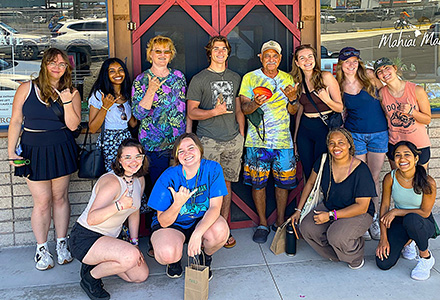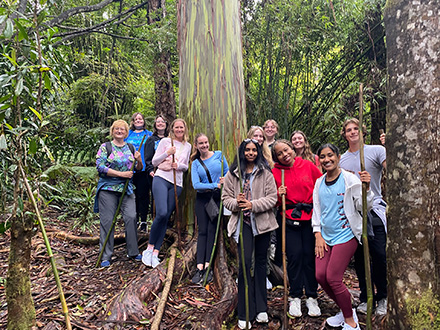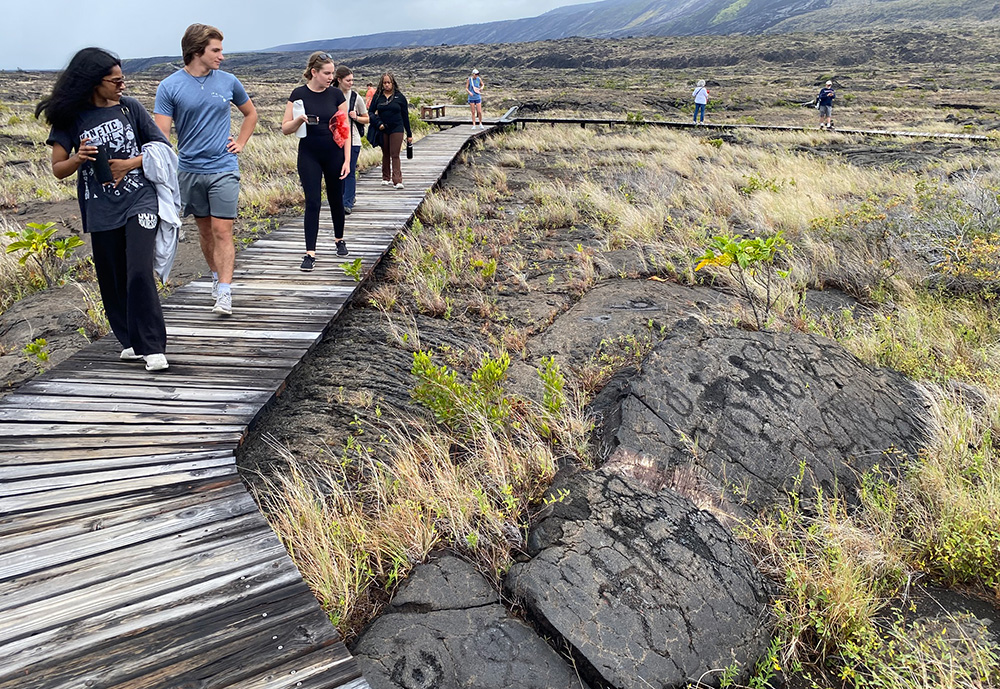By Sarah Sell, University Communications and Marketing
Hiking around lava fields, making chocolate from freshly harvested cacao pods and learning about environmental restoration in a cloud forest were just a few of the unforgettable experiences for ten USF students who recently returned from an educational adventure on Hawaii's Big Island.
As part of a transformative study away program through the Judy Genshaft Honors College, the group explored the island's natural beauty and cultural history. They witnessed active volcanoes, snorkeled in coral reefs and learned firsthand how Native Hawaiians work to protect and sustain their land.
The trip served as the capstone to Beyond the Classroom: Big Island, Hawai'i, a course that combines in-classroom learning with a 14-day trip to Hawaii.

The students harvested cocao pods on a sustainable farm and crafted their own chocolate at Mahi`ai Made chocolate factory in Hilo.
Designed as an interdisciplinary experience, the course brought students together from a variety of majors at USF, including political science, history, environmental science and policy, and mechanical engineering.
Led by Associate Professor of Instruction and Associate Director of USF's School of Hospitality and Tourism Management Brooke Hansen, the students benefitted from her deep connections to the Big Island. She previously lived and taught in Hawaii.
"The Big Island serves as a living-learning laboratory," said Hansen, who's been taking USF students on the trip for more than 25 years. "The point of this trip is to see how sustainability, education and conservation are being practiced and how we can bring that back home and enhance our resilience here."
Students visited the Kona Cloud Forest, a nature reserve dedicated to restoring native habitats after years of deforestation caused by sugar cane plantations. The visit highlighted how land use changes have increased the island's vulnerability to wildfires, like those that occurred in Lahaina in 2023.
"Learning from local people and being immersed in the land and culture reminded me how meaningful it can be to learn directly from the communities and environments you're studying,” said Lucille Wagenman, a sophomore on the St. Petersburg campus.
Wagenman hasn't chosen a major yet but is now considering education and anthropology. "It made me think more about how teaching can build real connections between people, culture and the environment."

The group visited the Kona Cloud Forest which gets much of its water from cloud and mist condensation, creating a cool, misty environment.
During their adventures, the group visited the former home of Audra Santerre, a National Merit Scholars coordinator on the St. Petersburg campus who accompanied the group as an advisor. Neighbors of Santerre's parents live off the grid on a sustainable farm. Students learned how the family collects water, creates composting toilets and produces electricity without relying on traditional utilities.
"My favorite part of this trip was seeing new ways of living," said Anthony Marocco, a mechanical engineering major on the Tampa campus. "It helped me understand that there's not just one path to take in life. These new perspectives will be something I'll strive to integrate in my future career in engineering and will help me shape the way I perceive the world."
Inspired by lessons in sustainable living, the group went on to explore some of the island’s most famous features. They visited Hawai’i Volcanoes National Park, home to Kilauea, one of the world's most active volcanoes. They stayed overnight at a coffee farm where Kona coffee is grown in volcanic soil that contributes to its unique flavor. They ended the trip snorkeling along Hawaii's coral reef.
Each stop taught them more about the island's unique and fragile environment and why sustainability is so important to those who live there.
"We can learn some of that through books and maybe the internet, but nothing replaces experiential education,” Hansen said. "Being fully immersed with all your senses in places that have so much culture and history teaches us how to be better citizens on earth."
